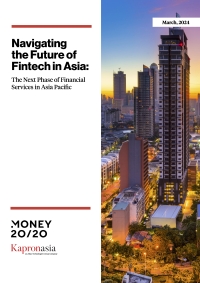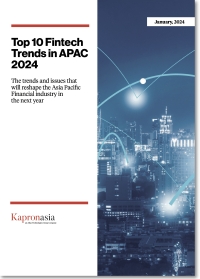Thank You for subscribing
Thank you for subscribing.
Our newsletter is published every Friday and you're on our list!
In the meantime, please check out some of our more popular reports:
-
Published in Kapronasia InformationTags:
Digital humanitarian payments have been evolving rapidly, and the COVID-19 pandemic has accelerated the acceptance of digital payments across the globe.
Published in Research ReportsTags:The recent pandemic has been an extreme example of financial institutions (FIs) finding themselves blindsided by disruptive events. But meeting unexpected demands is a constant across all aspects of an FI’s business. Customer priorities can also shift according to economic and environmental circumstances, necessitating FIs to respond by providing customers the ability to choose how and where they want to transact – without encountering exorbitant costs, and ensuring data security remains paramount. This paper was written on the basis of the Adapting for Uncertainty webinar from Kapronasia in collaboration with Equinix.
Published in Research ReportsTags:The advent of electronic trading in the 1980s in the United States introduced a new era of algorithmic or high frequency trading (HFT) whereby firms tried to get their trading applications as close as possible to an exchange’s matching engine to lower latency and speed up trade execution. By the 2000s, the exchanges were moving their matching engines into colocation data centres, where they were joined by the HFTs that would find no better substitute to being colocated in the same building as the matching engine itself. Today, it is no longer all about speed, and the belief that it is only HFTs that are in exchange colos could not be further from the truth.
Published in Research ReportsTags:Asia, with its gleaming skyscrapers dotting some of the world's major financial centers and home to more than half the world's population, is at an inflection point. Facing spiralling compliance costs and a dynamic regulatory environment, financial institutions have turned to regulatory technology (regtech) to help acheive compliance while minimising risk from misconduct and regulatory investigations.
Published in Research ReportsTags:Published in Webinar RecordingsTags:Automation, cloud, and artificial intelligence technologies are enabling financial institutions (FIs) to reduce overhead, touchpoint, and risk of human error around middle- and back-office operations. The use of these technologies has taken on new relevance amid the coronavirus pandemic and accompanying shift to working online as FIs needed to completely re-think how to run their businesses. Now more than ever, the financial industry must use innovative solutions to enhance operational efficiency and competitiveness, while striving to enhance service levels offered to their customers and remain compliant.
Published in Research ReportsTags:Both regulatory and competitive forces have been making Open Banking a new reality across the region. Banks are now realizing that if they want to keep their existing customers, acquire new ones, and play a greater role in their customers’ lives then they must become more customer focused, while offering a broader range of digital products and services. To do this effectively, banks will no longer be able to be vertically integrated institutions and will be required to shift to a distributed Open Banking model to collaborate with third parties. Such a model requires APIs, the digital ports that enable communication between services.
Published in Research ReportsTags:March 26 2021Staying Resilient: How Financial Institutions are Leveraging Automation to Innovate and Compete - Recording
Published in Webinar RecordingsTags:Published in Webinar RecordingsTags:












